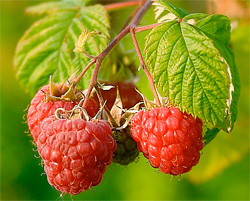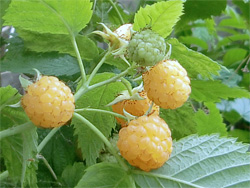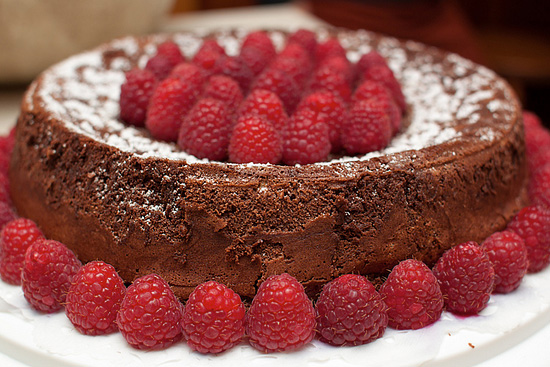 image: Juhanson via Wikimedia
image: Juhanson via Wikimedia
Raspberries for Northern and Southern Climates
Even if you live far to the north, with cold winters and harsh winds, you’ll likely have microclimates, where raspberries will produce. For instance, you may have a south-facing slope that receives more sunshine and less snow than a nearby north-facing slope. Or, you may have a place that gets plenty of sun, but a building or natural geography protects the plants from strong winds. However, picking hardy plants for northern climates is a must, no matter what kind of microclimate you may have.
Summer-bearing raspberries need to overwinter. Among the best cold-hardy varieties for zone 4, (and sometimes zone 3 if planted on a south-facing slope), are “Macbeth,” “Jewel” and “Bristol” for black raspberries. For red raspberries, you might want to try “Nova,” “Encore” or “Prelude.” “Royalty” and “Brandywine” are both cold hardy and produce purple raspberries.
 Golden raspberry variety.
Golden raspberry variety.Image by J. Cardy via Wikipedia.
Fall-bearing varieties that are cold tolerant to zone 4 include “Anne,” which produces golden fruit; and “Caroline” and “Jaclyn” for red raspberries.
Most fall-bearing raspberries can be grown in a southern climate with a little chilling over the winter. If they don’t get enough cold however, most varieties will produce a smaller crop. On the other hand, if temperatures climb too high in the summer, raspberries stop photosynthesis. Once this process stops, they can quickly sicken and die. To protect them from hot sun, make sure the canes get light shade in the afternoon. You can also provide shade with lightweight row covers. If it’s extremely hot, you can sprinkle the row covers with water from a hose.
For those in zone 7, “Barberry” and “Oregon 1030” both tolerate heat better than other varieties.
Thornless Raspberries
Thornless raspberries are still being created by breeders. When picking a plant, choose one of the newer varieties, although they may be a bit higher in price. Newer cultivars have more disease resistance and larger berries. Since they’ll last for years, newer varieties are worth the price.
Plant and cultivate thornless raspberries the same as you would regular raspberries. Generally, they require the same care because, except for the absence of thorns, they’re basically the same.
Should You Get Organic Raspberry Plants?
Whether or not you choose to grow organic raspberries depends on why you want to plant them in the first place. If you’re on a tight budget, and simply want to grow your own food, there’s no need to pay a premium price for an organic plant. On the other hand, if you want to grow raspberries to sell, organic raspberries will bring a higher price.
If you are considering growing and selling organic raspberries, check first with your local agricultural extension office. The National Organic Program specifies the rules that have to be followed to label food as Organic. If you can’t certify the plants, as well as the soil, as organic, then you cannot legally label your berries as organic. In general, lab testing the soil is involved, and depending on the state, the tests may need to prove that no insecticide, pesticide, herbicide, chemical fertilizer, or other chemicals are present.
Remember, anything and everything that you add to the soil will have to be certified as organic. If you add manure or compost to the soil, or mulch the canes with sawdust or other substances, everything will have to be lab tested and certified organic before application. Something as simple as adding cut grass to your compost can be a disaster if you apply it to your organic canes and later find out the grass was fertilized with a non-organic chemical. You won’t be able to use the affected canes for organic berries for at least 3 years or more. In addition, make sure your canes aren’t planted near fields that are being treated by spraying them with chemicals. The drift from the spray can ruin all your hard work.
Whether you choose organic, summer-bearing, ever-bearing, red, black, purple or golden raspberries, you’re certain to be rewarded.

Raspberries and chocolate go so well together. Makes your mouth water, doesn't it?
Image by T. Stackton via Flickr.